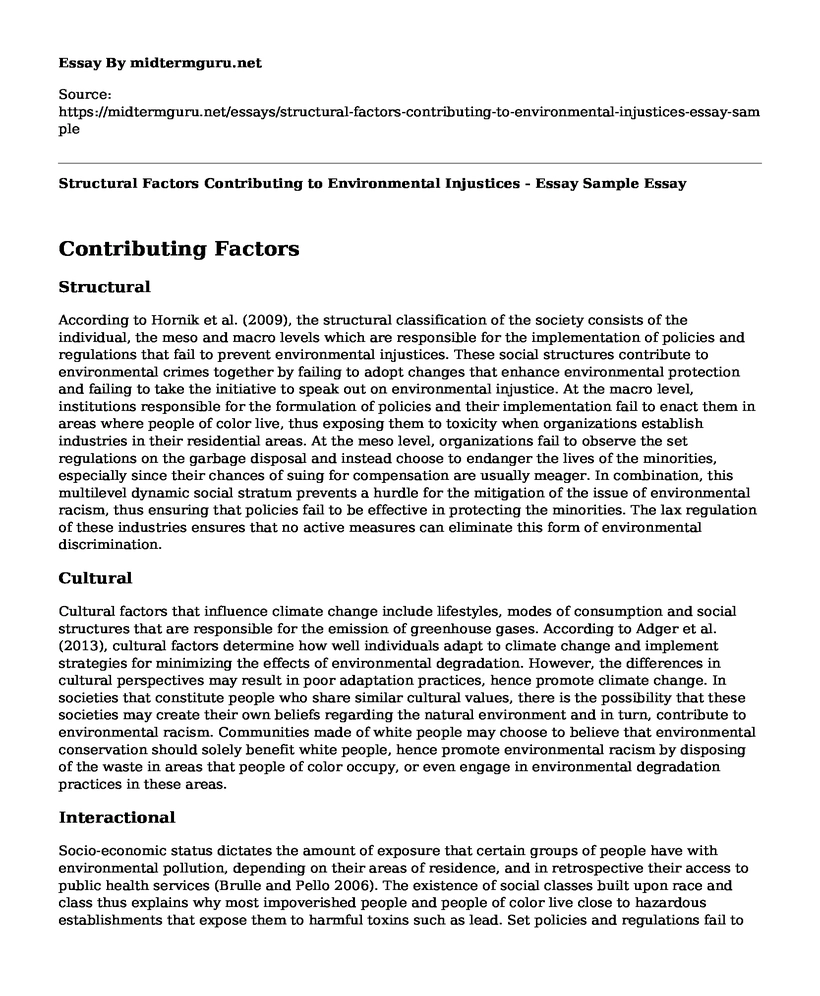Contributing Factors
Structural
According to Hornik et al. (2009), the structural classification of the society consists of the individual, the meso and macro levels which are responsible for the implementation of policies and regulations that fail to prevent environmental injustices. These social structures contribute to environmental crimes together by failing to adopt changes that enhance environmental protection and failing to take the initiative to speak out on environmental injustice. At the macro level, institutions responsible for the formulation of policies and their implementation fail to enact them in areas where people of color live, thus exposing them to toxicity when organizations establish industries in their residential areas. At the meso level, organizations fail to observe the set regulations on the garbage disposal and instead choose to endanger the lives of the minorities, especially since their chances of suing for compensation are usually meager. In combination, this multilevel dynamic social stratum prevents a hurdle for the mitigation of the issue of environmental racism, thus ensuring that policies fail to be effective in protecting the minorities. The lax regulation of these industries ensures that no active measures can eliminate this form of environmental discrimination.
Cultural
Cultural factors that influence climate change include lifestyles, modes of consumption and social structures that are responsible for the emission of greenhouse gases. According to Adger et al. (2013), cultural factors determine how well individuals adapt to climate change and implement strategies for minimizing the effects of environmental degradation. However, the differences in cultural perspectives may result in poor adaptation practices, hence promote climate change. In societies that constitute people who share similar cultural values, there is the possibility that these societies may create their own beliefs regarding the natural environment and in turn, contribute to environmental racism. Communities made of white people may choose to believe that environmental conservation should solely benefit white people, hence promote environmental racism by disposing of the waste in areas that people of color occupy, or even engage in environmental degradation practices in these areas.
Interactional
Socio-economic status dictates the amount of exposure that certain groups of people have with environmental pollution, depending on their areas of residence, and in retrospective their access to public health services (Brulle and Pello 2006). The existence of social classes built upon race and class thus explains why most impoverished people and people of color live close to hazardous establishments that expose them to harmful toxins such as lead. Set policies and regulations fail to act if a company dumps toxic waste near living areas for people of color, thus exposing to illnesses that may result from exposure to waste, poisons, noise, overcrowding and poor-quality housing (Brulle and Pello, 2006). The non-white poor who are usually less educated on their civil rights thus fail to contest this racism. In other cases, the minorities of color are forced to move to geographical regions that are inhabitable for purposes of economic development and thus unknowingly contribute to the existence of climate change and environmental racism.
Political
Political factors that contribute to the issue of climate change and environmental injustice include the failure of those in power to put aside mitigation policies that can regulate the emission of toxic waste into the environment (Bhatasara 2015). Global treaties have failed to limit the emission of greenhouse gases into the atmosphere by industries in developed countries. These treaties thus fail to protect developing countries that are forced to suffer the effects of climate change resulting from global warming. Global governance collides with the need to attain global economic stability, especially since the economy is dependent on the use of fossil fuels that emit carbon dioxide. Governments also fail to adequately address the issue of climate change due to the financial implications of mitigation factors that require expensive technology to enhance management. Moreover, developing countries lack the necessary technology to deal with pollutants that international industries deposit in them, leaving them to suffer the adversity of climatic change. The 2010 United Nations Climate Change Conference failed to adequately address the issue of environmental change, only seeking to provide compensation to countries affected by carbon emissions and failing to address the immense damage and losses that these countries incur in the process.
How Society or Power Structure Within Society May Address This Problem
The theories presented above show that climate change and environmental racism are social issues that require the efforts of dynamic social systems to counter the effects. According to Hornik et al. (2016), different societal constituents may address the issue independently before all efforts combine to mitigate these issues. Hornik et al. (2016) advise that individuals should be ready to adjust their activities that may contribute to climate change, to reduce pollution and its effects. Similarly, organizations at the meso level should utilize their positions to advocate for alternative methods of production that limit the emission of greenhouse gases and even develop technology that is useful in overseeing this change. At the macro-level, the authors advise on ensuring that institutions in charge of formulating policies can come up with a model that will enhance change by reducing environmental degradation and observing e...
Cite this page
Structural Factors Contributing to Environmental Injustices - Essay Sample. (2023, Jan 08). Retrieved from https://midtermguru.com/essays/structural-factors-contributing-to-environmental-injustices-essay-sample
If you are the original author of this essay and no longer wish to have it published on the midtermguru.com website, please click below to request its removal:
- Questions on Public Health: Pregnancy Duration and Air Quality Values
- Article Analysis Essay on Effects of Glaciation
- Paper Example on NRF Guidelines: NGO and Volunteer Management
- The Concept of Social Behavior - Research Paper
- Annotated Bibliography on Race, Death, & Justice
- UHC: Ensuring Quality, Affordable Healthcare for All - Essay Sample
- Paper Example on Challenges Brought About by Global Warming







